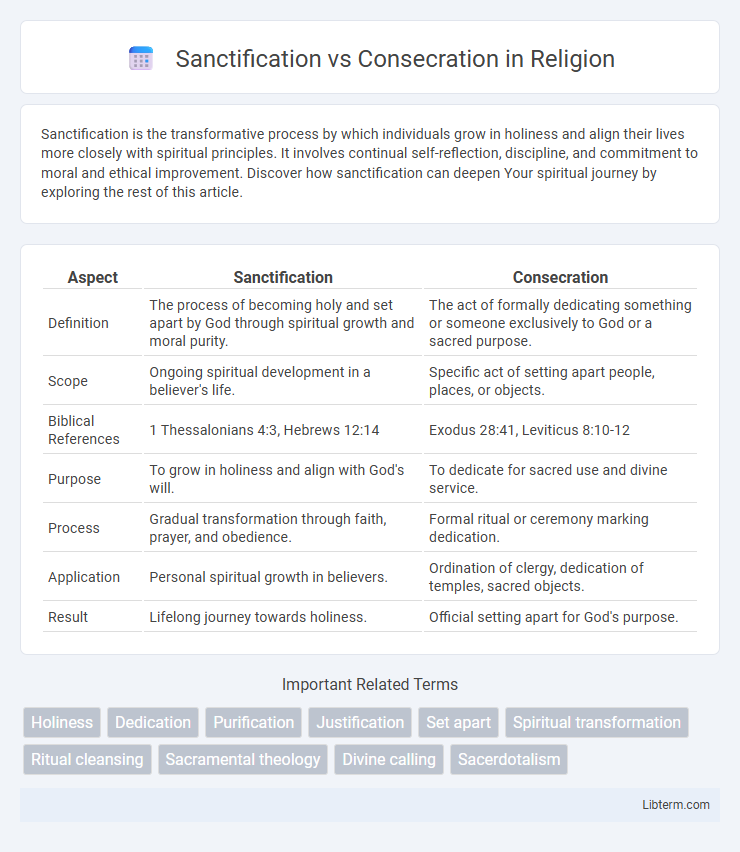Sanctification is the transformative process by which individuals grow in holiness and align their lives more closely with spiritual principles. It involves continual self-reflection, discipline, and commitment to moral and ethical improvement. Discover how sanctification can deepen Your spiritual journey by exploring the rest of this article.
Table of Comparison
| Aspect | Sanctification | Consecration |
|---|---|---|
| Definition | The process of becoming holy and set apart by God through spiritual growth and moral purity. | The act of formally dedicating something or someone exclusively to God or a sacred purpose. |
| Scope | Ongoing spiritual development in a believer's life. | Specific act of setting apart people, places, or objects. |
| Biblical References | 1 Thessalonians 4:3, Hebrews 12:14 | Exodus 28:41, Leviticus 8:10-12 |
| Purpose | To grow in holiness and align with God's will. | To dedicate for sacred use and divine service. |
| Process | Gradual transformation through faith, prayer, and obedience. | Formal ritual or ceremony marking dedication. |
| Application | Personal spiritual growth in believers. | Ordination of clergy, dedication of temples, sacred objects. |
| Result | Lifelong journey towards holiness. | Official setting apart for God's purpose. |
Understanding Sanctification: A Spiritual Transformation
Sanctification is a progressive spiritual transformation where believers are gradually made holy through the work of the Holy Spirit, aligning their character with God's will. It involves ongoing renewal and purification that distinguishes a Christian life from worldly influences, fostering growth in grace and righteousness. Unlike consecration, which is an initial dedication or setting apart for a divine purpose, sanctification reflects continuous sanctity and moral development over time.
What Is Consecration? Definitions and Key Concepts
Consecration is the solemn act of dedicating a person, place, or object exclusively to a sacred purpose, often marked by a formal ceremony or ritual. It involves setting apart something from common use to become holy and devoted to divine service, reflecting a permanent commitment. Key concepts include ritual purity, divine ownership, and an irreversible transformation distinguishing consecrated entities from ordinary ones.
Biblical Foundations of Sanctification
Sanctification in the Bible refers to the ongoing process by which believers are set apart and progressively made holy through the work of the Holy Spirit, as seen in passages like 1 Thessalonians 4:3 and Hebrews 12:14. Consecration, on the other hand, often denotes a specific act of dedicating someone or something to God's service, exemplified in Exodus 29:1-37 with the consecration of priests. Biblical foundations of sanctification emphasize spiritual growth, moral transformation, and Christlikeness as essential outcomes of a believer's union with Christ (Romans 6:19-22, Galatians 5:16-25).
Scriptural Basis for Consecration
Consecration in Scripture is rooted in passages such as Leviticus 20:7-8, where God commands the Israelites to consecrate themselves and be holy because He is holy, establishing a clear call to set apart individuals, objects, or places exclusively for divine purposes. In the New Testament, Romans 12:1 urges believers to present their bodies as living sacrifices, holy and pleasing to God, emphasizing the personal and continuous nature of consecration. Unlike sanctification, which refers to the ongoing process of being made holy, consecration specifically involves a deliberate act of dedication, marked by separation from sin and worldly purposes to serve God fully.
Sanctification vs Consecration: Core Differences
Sanctification refers to the ongoing process of being made holy through spiritual growth and moral transformation, whereas consecration denotes a formal dedication or setting apart of a person, place, or object for sacred use. Sanctification emphasizes internal change and purification over time, while consecration is a specific act or ceremony signaling devotion to a divine purpose. Understanding the core differences highlights sanctification as a continuous spiritual journey and consecration as a distinct commitment.
The Process of Sanctification in Christian Life
The process of sanctification in Christian life involves a continuous transformation whereby believers gradually grow in holiness through the work of the Holy Spirit. This spiritual journey includes daily repentance, prayer, studying Scripture, and obedience to God's commandments, enabling Christians to reflect Christ's character more fully. Sanctification differs from consecration, as it is an ongoing internal process, while consecration typically refers to a deliberate act of setting apart for holy purposes.
How Consecration Shapes Faith and Devotion
Consecration shapes faith and devotion by dedicating individuals, places, or objects exclusively to a sacred purpose, fostering a deeper spiritual commitment and enhancing religious discipline. This act of setting apart intensifies personal and communal relationships with the divine, encouraging more focused worship and obedience to spiritual principles. Through consecration, believers experience a transformative process that cultivates holiness and a concentrated devotion within their faith practices.
Practical Steps Toward Sanctification and Consecration
Practical steps toward sanctification include daily prayer, consistent Bible study, and intentional obedience to God's commandments, fostering spiritual growth and moral purity. Consecration involves dedicating specific time, resources, or oneself fully to God's service through vows, special rituals, or setting apart sacred spaces and objects. Both processes require ongoing commitment, self-discipline, and a heart oriented toward holiness and divine purpose.
The Role of the Holy Spirit in Sanctification and Consecration
The Holy Spirit plays a pivotal role in both sanctification and consecration by purifying believers' hearts and empowering them for holy living and service. In sanctification, the Holy Spirit continually transforms believers, enabling them to grow in holiness and reflect Christ's character. During consecration, the Holy Spirit equips individuals with specific gifts and guidance to dedicate their lives or specific actions to God's purposes.
Living a Life Set Apart: Integrating Sanctification and Consecration
Sanctification and consecration both emphasize living a life set apart for divine purposes, with sanctification focusing on the ongoing process of spiritual growth and moral purification, while consecration involves dedicating oneself wholly and ceremonially to God's service. Integrating these concepts fosters a continuous commitment to holiness, blending daily transformation with intentional devotion. This synergy encourages believers to embody sacred values consistently, aligning actions with a distinct spiritual calling.
Sanctification Infographic

 libterm.com
libterm.com